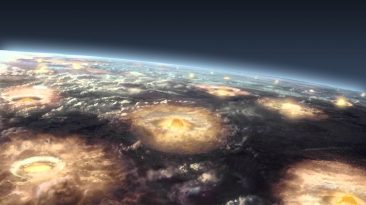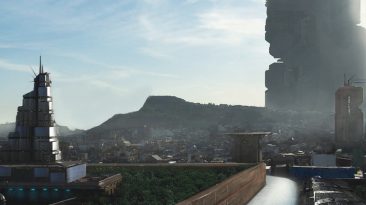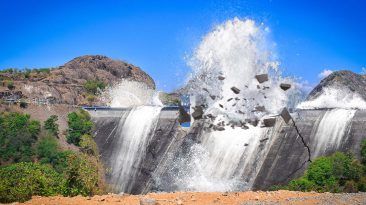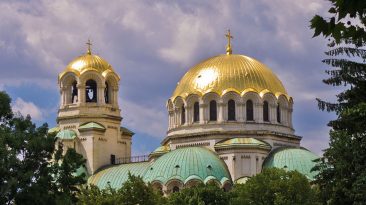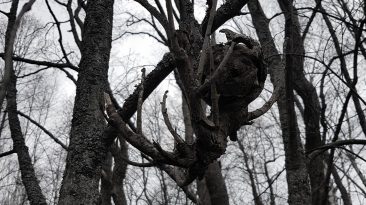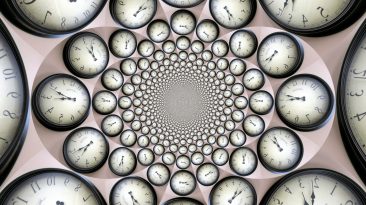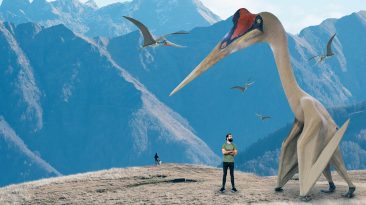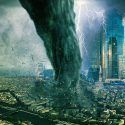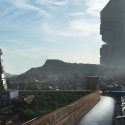As the nukes dropped on every major city around the globe, everyone sought shelter, but there was nowhere to hide. In an instant, civilization as we knew it was destroyed. Every server, library, and entity that stored information about who we are, what we did, and how we lived was gone.
Only a handful of children worldwide survived, all kept in the deepest bunkers we could find. No adults could make it.
Everything about humanity before the blast would be lost entirely in around five generations. Sure, there are tales, mysteries, and legends. But no historical record of life before the final world war; there is no way our descendants’ thousands of years from now can know who were were.
This story might sound a little far-fetched, but the reality is, for all we know, this could have happened already. Maybe except for the nuclear part, because no evidence suggests that manmade nuclear weapons existed before Oppenheimer.
But the rest of it could be true because there’s so much we don’t know about the history of our world and humans.
At one point, we knew more… until the fire.
In 48 BC, the Library of Alexandria, located in Alexandria in what is now Egypt, burned down. Historians estimate that at one point, the library held over half a million documents from Assyria, Greece, Persia, Egypt, India, and other nations.
Sadly, as the pages turned into ashes, the most significant assembly of information about the ancient world disappeared.
There are a lot of theories about who started the fire. Julius Caesar is one of the most routinely accused people. He was driving his soldiers into Egypt when an Egyptian fleet in Alexandria cut him off. Legend has it that Caesar’s ships were outnumbered, so they set all the ships in the harbor on fire. This fire then spread and destroyed parts of the city, including the library.
Another theory blames the fire on one of the Muslim conquerors of Egypt, Caliph Omar. The story goes that scrolls were burned for fuel for thousands of hot baths in the city. But there’s some skepticism about why a Muslim would burn Jewish and Christian texts since they’re also the holy texts in Islam.
Most likely, it wasn’t a dramatic fire that started in the harbor or an attempt to make fuel, but a series of events that happened over time to destroy the library, culminating in a fire.
But who burned it is not the real question we have. What knowledge was in there that we missed out on? What insights did ancient historians and philosophers have about humanity that we’ll never know? These are the more essential questions, questions that we might never know the answer to.
Beyond the Library of Alexandria, what about all the information never written down in the first place? The reality is that most of human history has been lost to time, and as a result, so many people have come up with their own conclusions about what we were. Before discussing those, here are the things we know about our past.
Humans first appeared about 300,000 years ago while Earth was in the middle of the last Ice Age. It was a harsh environment to come into existence in. As a result, human populations were tiny and grew slowly.
The Stone Age, our most ancient time, lasted until about 3000 BC. This era was marked by the use of tools and, most importantly, saw a transformation of our culture from hunting and gathering to farming and food production.
Humans in the Stone Age lived in caves or very simple huts and teepees. They learned to control fire to keep their homes warm, scare away predators, and cook their prey like woolly mammoths, deer, and bison.
These early humans were also the first to leave behind art in the form of etched people, animals, and signs on the walls of caves or carved into items.
With time, their tools evolved from rough, dull shapes to polished, pointed items that served as spears and arrows. And eventually, they started settling more permanently in villages and began farming. We know this from the appearance of polished hand axes and other tools used to till farmland. As they settled, advancements were made in home construction, poetry, sewing, and weaving.
As human civilization expanded, something interesting also happened. Human activity reached a tipping point where hunting and farming began to impact the natural world. The proportion of plants to animals was relatively stable until about 4000 BC. Since then, humans have been affecting our environment at an increasing pace.
In 3300 BC came the Bronze Age, which lasted until about 1300 BC. This is where tools took off. Metal was introduced, which not only led to the production of better tools but also better weapons.
With better weapons came many different things to fight about, organized government, law, and religion.
In this time, humans also started using advanced tools like a potter’s wheel and began creating textiles instead of just wearing animal skins to keep themselves warm. And, perhaps, most famously, this was the beginning of written history. Egyptian hieroglyphs, the first known recordings, appeared.
Then, we enter the Iron Age. From 1300 BC to 900 BC, humankind had a lot going on. We saw the introduction of heating and forging iron which led to the mass production of tools and weapons. Four-room homes, some with stables for domesticated animals, showed up. There’s also evidence of early city planning, with blocks of houses and water systems running between them.
Agriculture, art, and religion all became more sophisticated. Finally, we developed writing systems and written documentation.
At the end of the Iron Age, we moved into the Early Historical Period, where documentation of human history became more widespread.
This is pretty much everything we are sure of about the ancient world, much of which we learned through fossils. But fossils can only tell us so much.
How did these people live? What were their daily routines like? What were their favorite foods? Small talk? Big dreams? We sadly don’t know, and so people have made theories.
What MIGHT humans have been like before recorded history started?
Much like the Greeks made up myths of powerful gods to explain their daily lives and emotions, people have been developing theories about the history of humankind forever.
Theories like the original Eve. A human who birthed, literally or figuratively, the rest of humankind? It could be possible because, in the 1980s, DNA sequencing demonstrated that this “Eve” might have existed as recently as 120,000 years ago. Then skulls found in East Africa provided suggestions about what she might have looked like and where she might have lived.
People became obsessed with this idea of a real-life Eve. No longer just a figure from the Bible but a woman who was the ancestor to us all. This idea made its way into pop culture, grasping people worldwide.
And what about the possibility that our distant ancestors were much more advanced than we give them credit for?
It’s always been assumed that humans in the Upper Paleolithic period, from 50,000 to 15,000 BC, were bands of foragers, never establishing any sort of tradition or organization within their groups. But recently, evidence of ‘princely’ burials and grand buildings has appeared.
Burials were found across western Eurasia. They weren’t full cemeteries but isolated graves of individuals or small groups, bodies placed in specific postures and sometimes decorated with ornaments. The idea that a band of foragers would bury some, but not all, of their dead in this ceremonial way had never been considered.
Similarly, stone temples dating back to this time were discovered in Turkey, some over five meters high and weighing about eight tons. The temples had raised pillars and were linked by stone walls. Each post contained a unique sculpture carved with images of the world ancient humans were living in. Such structures imply the coordinated activity of humans. It takes a lot of communication and teamwork to build something so significant.
We always assumed little happened in the Paleolithic era, but perhaps there was more of a society than we thought. Maybe ancient humans in this time weren’t moving about in small groups, never settling into tradition or community. Perhaps they had leaders and dynasties. The evidence is murky, but who’s to say one way or another?
Theories about our ancient ancestors are constantly changing. For instance, in the late 19th and early 20th centuries, people in Europe and North America thought that primitive humans weren’t capable of full consciousness like they were still savage in some way. Now, no scholar would claim that.
Yet some experts still dismiss distant humans’ imagination or skepticism of their world. Others have always taken seriously the idea that humans were our intellectual equals. Why wouldn’t they have some sort of political system or burial ceremony?
It’s almost impossible to know.
And the questions don’t stop with our human history. What about the history of our planet? What came before us that was never recorded? Could there have been a civilization before humans created the one we live in today?
To have civilization, you need a food surplus which frees up most people to specialize in doing things other than producing food. You need farming. You also would require a specific minimum population density, or you wouldn’t have enough individuals to run this theoretical civilization.
Is there any way we could know if something like this existed? Fossils could easily miss an industrial civilization that lasted only 100,000 years, which, for the record, is 500 times longer than our current industrial civilization has been around.
Since any ancient civilization would have needed energy and the capacity to exploit fossil fuels and other power sources as we do, scientists can theoretically look for worldwide effects that leave traces of this. Perhaps there would be naturally occurring evidence like remnants of certain fossil fuels. There could also be non-natural evidence, like a product that compares to our plastic use.
And you might think we haven’t found any signs of this, but you’d be wrong. There has been the discovery of a thermal maximum event that occurred about 55.5 million years ago and lasted for about 100,000 years. We’ve found chemical signals and traces of warming that look similar to the chemical signals and traces of our current world. It led to a global temperature rise of nine to fourteen degrees Fahrenheit.
Could this be evidence of a pre-Ice Age industrial society? According to scientists who’ve explored the issue, probably not. But it’s important to ask because we’ll never discover anything if we don’t ask.
What did ancient languages sound like as they rolled off people’s tongues? What did they do when they encountered others who spoke differently than them? Were they afraid, or did they have a way to translate?
What emotions did people have when someone died? Was it the same grief that we experienced? What about relationships? Did mothers fight with their teenage daughters? Did people long for a sense of romantic love?
There’s only so much we can gather from skeletal remains and fossils. We’ll never know what these societies were like because society is so much more than the remnants it leaves behind after it falls.
And that’s why an event like the burning of the Library of Alexandria is so poignant. It is a cautionary tale of the danger of the deprioritization of institutions that preserve and share knowledge. The term ‘Alexandria’ has become shorthand for ignorance winning out.
From the French Revolution to the late 20th Century, Alexandria is a common term to describe the destruction of libraries and archives that are abandoned and forgotten. So, yes, books were burned in Alexandria, but perhaps the actual crime was people not caring enough about their preservation in the first place.
Attacks on knowledge can come from violence, like in the Holocaust or China’s cultural revolution. But it can also come from the apathy towards institutions like we’re witnessing today.
In Iraq and Mali, Islamic extremists have targeted libraries. In the United Kingdom, more than 800 public libraries have closed over the past decade due to a lack of resources from the government.
Now, tech companies are taking control of our archives as we move deeper into the digital era. But there’s little regulation around what these powerful companies can do with our knowledge and history.
In the end, it’s going to be our experiences that tell the story of our world. Do we want to live it all to a few tech billionaires executed to decide what stories get kept and which get burned?
I expand on this idea in this video; Big Tech is Destroying Ownership; click on your screen to watch that next.












